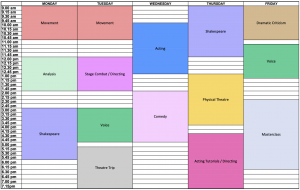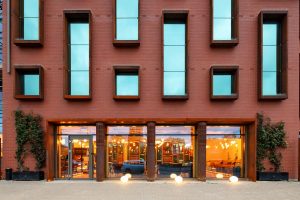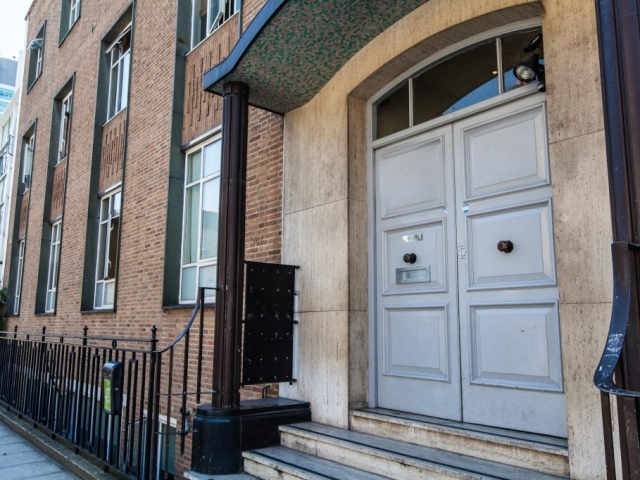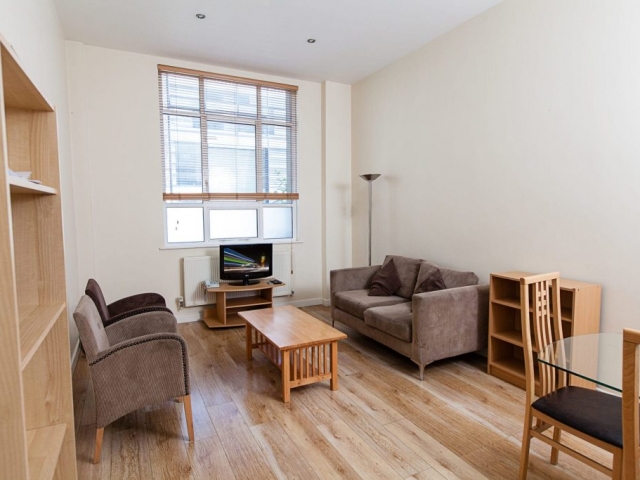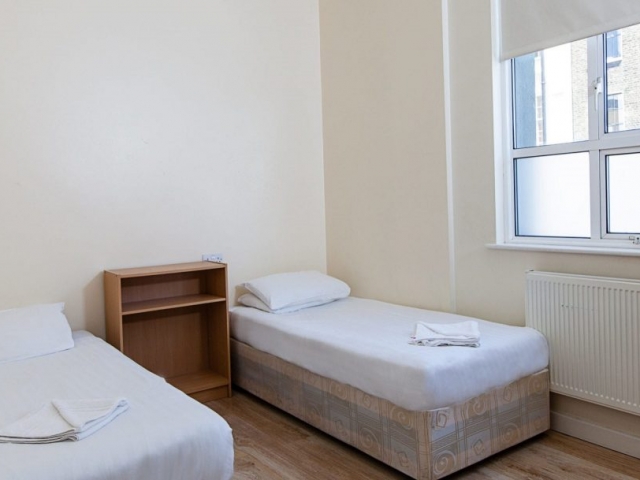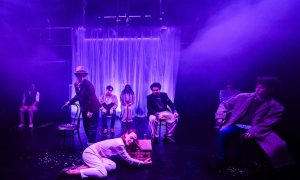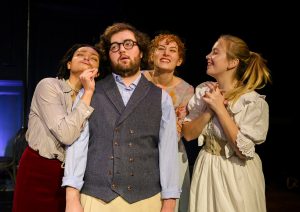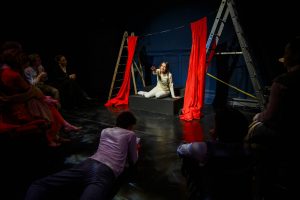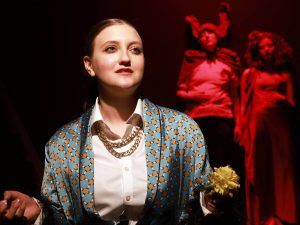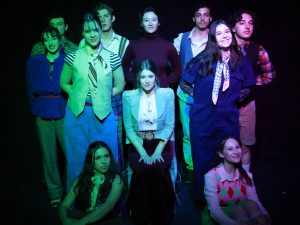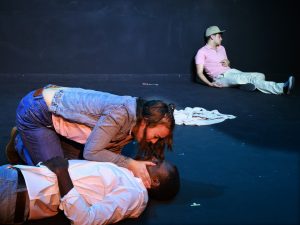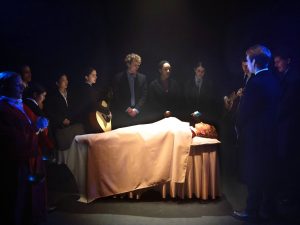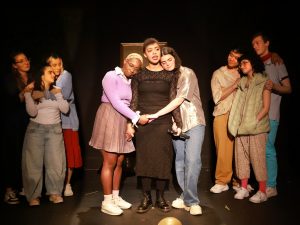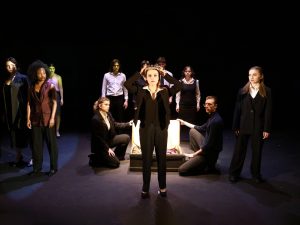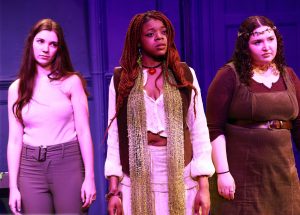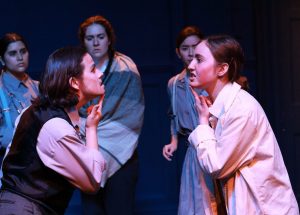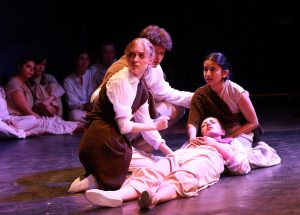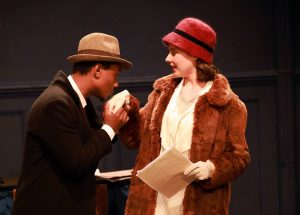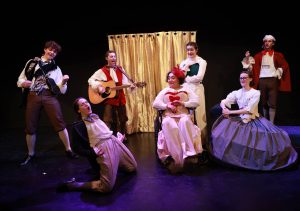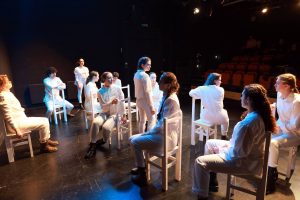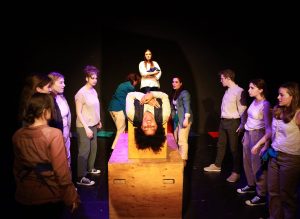LONDON THEATRE PROGRAM
Opened in 1985, the London Theatre Program (LTP) is BADA’s undergraduate conservatory theatre programme in London, accredited by Sarah Lawrence College. The London Theatre Program is designed for talented and dedicated students who are passionate about acting or directing, about the art of theatre, and who are seeking personal challenges and new perspectives.
The LTP offers two different tracks: Acting and Directing. Students may apply to either the Acting track or the Directing track.
The is open to Juniors and Senior year students at any accredited American college or university and students may enroll in either the Fall or the Spring semester.
-
-
As of Fall 2024, BADA offers a Directing track on the London Theatre Program for students who aim for a career as a professional director. There are a limited number of spaces each semester for directing students. Directing and acting students will be in a number of classes together during the first eight weeks of the semester and each directing student will work as an assistant director for five weeks on one of the end-of-semester productions.
This is an exciting opportunity for students who are passionate about directing to take advantage of studying in one of the world’s most important theatrical centers. Directing students will have access not only to BADA’s internationally-renowned faculty of teaching artists and masterclass guests, but also to working professional directors. Students will leave BADA with a unique insight into both the actor’s and the director’s creative process.
For more information about the directing option, contact Seth Dranginis at sdranginis@bada.org.uk.
-
Students may apply for either the Acting track or the Directing track; the specific application requirements will vary depending on the desired track. To start an application, or for information about applying to the London Theatre Program, including application deadlines, visit the London Theatre Program page at Sarah Lawrence College.
Acting applicants need to prepare the following for their audition:
- Some words about yourself: your name, age, what school you attend; when you began studying acting; how you heard about the London Theatre Program, and why you are applying.
- A memorized speech by Shakespeare or one of his contemporaries, no longer than 2 minutes.
- A memorized speech from a modern or contemporary text, no longer than 2 minutes.
One speech should be delivered in close-up, the other in mid-shot (waist up). Each individual meeting will last no more than 15 minutes and will include a chat with a member of the BADA Faculty.
Directing applicants need to prepare the following for their application:
- Personal statement (approximately 500 words): Tell us about your interest in and experience directing and why you are interested in attending this program.
- CV detailing your directing experience
Directing applicants will also have an online interview with with the Dean or Directing Tutor; each meeting will last no more than 15 minutes.
If you’d like to be notified about future London Theatre Program semesters, please sign up for our mailing list.
-
This programme runs in both the Fall and the Spring. The semester is divided into two parts: eight weeks of training, with five weeks of rehearsals after the week-long mid-term break. Students will be in class or rehearsal around 30-35 hours a week, with weekly theatre trips and an expectation of learning and preparation outside the class or rehearsal room. Acting and directing students will be in a number of classes together. Each class will number between 12-16 students, and last either two or three hours.
The eight weeks of training begin with community workshops on Boundaries and Consent, and then comprise:
- Acting (classes and tutorials, 1 credit, memorization required): Acting classes and tutorials use both classical and modern texts to examine the fundamental principles of a contemporary post-Stanislavskyan acting methodology.
- Shakespeare (classes, 2 credits, memorization required): a contemporary and progressive approach to acting Shakespearean text, focusing on clarity, psychology and performance conditions, and responding to discourses around identity and ownership.
- Comedy (classes, 1 credit, memorization required): classes examining the acting of plays from the Restoration and comedy of manners traditions, focusing on verbal and mental dexterity, heightened performance style and comic timing.
- Physical Theatre (classes, 1 credit): classes in the Lecoq/Gaulier physical theatre tradition, focusing on improvisation, physical presence and ensemble performance.
- Voice (classes, 2 credits, memorization required): classes in the fundamentals of voice, focusing on breath, body, articulation and the connection of voice & text.
- Movement (classes, 2 credits): classes training the actor’s body for performance, drawing on a variety of contemporary movement methodologies.
- Stage Combat (classes, 1 credit): classes in unarmed combat focusing on safety, control, period styles, and technical virtuosity.
- Dramatic Criticism (seminars, 1 credit): seminars respond to the weekly theatre visits during the first seven weeks, encouraging students to develop fresh ways of watching, thinking and writing about theatre in the digital age. Formal written work is a component of the class.
- Analysis (classes, 1 credit): Analysis classes consider the playtext as a product of the political, social and psychological moment of its creation and of the material circumstances of performance, while simultaneously examining dramatic text as a blueprint for contemporary performance. Detailed analysis of one or more scenes from classic plays will be undertaken during the semester and an annotated scene script will be submitted for assessment.
The final five weeks of the course are devoted to:
- Acting in Performance (rehearsals, performance, 3 credits, memorization required): Students will rehearse studio productions of British and European classical plays, culminating in performance in a small-scale professional theatre. Each production is led by a professional director, working with professional creative and technical teams.
Additionally, the first eight weeks of classes include:
- Weekly theatre trips to see significant productions at major theatres
- Masterclasses and Q&As with leading UK theatre practitioners, including actors, directors and other creative specialists. Recent Masterclass instructors include Brian Cox, Bryan Cranston, Sope Dirisu, Brandon Victor Dixon (MIO ’98), Julian Glover, Henry Goodman, Anna Gunn (LTP ’88), Greg Hicks, Robert Icke, Adam Kantor (MIO ’06), Fiona Shaw, Owen Teale and Deborah Warner.
-
The programme runs in both the Fall and the Spring. The semester is divided into two parts: eight weeks of training, with five weeks of rehearsals after the week-long mid-term break. Students will be in class or rehearsal around 30-35 hours a week, with weekly theatre trips and an expectation of learning and preparation outside the class or rehearsal room. Directing and acting students will be in a number of classes together. Each class will number between 12-16 students, with one directing student in each of the LTP cohorts; classes will last either two or three hours.
The eight weeks of training begin with community workshops on Boundaries and Consent, and then comprise:
- Directing (18 hours of seminars and 16 hours of tutorials, 1 credit): Through seven one-to-one weekly tutorials and six three-hour seminars, the directing students will examine the history and practice of theatre directing with particular reference to Shakespeare and texts from the European classical canon. Students will be required to consider the application of the principles of actor training studied in other classes to the task of directing actors and collaborating with a creative and technical team, and will be guided towards the creation of a concept pitch for a production of a classic play for their portfolio.
- Acting (classes and tutorials, 1 credit, memorization required): Acting classes and tutorials use both classical and modern texts to examine the fundamental principles of a contemporary post-Stanislavskyan acting methodology.
- Shakespeare (classes, 2 credits, memorization required): a contemporary and progressive approach to acting Shakespearean text, focusing on clarity, psychology and performance conditions, and responding to discourses around identity and ownership.
- Comedy (classes, 1 credit, memorization required): classes examining the acting of plays from the Restoration and comedy of manners traditions, focusing on verbal and mental dexterity, heightened performance style and comic timing.
- Physical Theatre (classes, 1 credit): classes in the Lecoq/Gaulier physical theatre tradition, focusing on improvisation, physical presence and ensemble performance.
- Voice (classes, 2 credits, memorization required): classes in the fundamentals of voice, focusing on breath, body, articulation and the connection of voice & text.
- Movement (classes, 2 credits): classes training the actor’s body for performance, drawing on a variety of contemporary movement methodologies.
- Dramatic Criticism (seminars, 1 credit): seminars respond to the weekly theatre visits during the first seven weeks, encouraging students to develop fresh ways of watching, thinking and writing about theatre in the digital age. Formal written work is a component of the class.
- Analysis (classes, 1 credit): Analysis classes consider the playtext as a product of the political, social and psychological moment of its creation and of the material circumstances of performance, while simultaneously examining dramatic text as a blueprint for contemporary performance. Detailed analysis of one or more scenes from classic plays will be undertaken during the semester and an annotated scene script will be submitted for assessment.
For the final five weeks, each directing student will be attached as assistant director to one of the end-of-term productions and will receive regular feedback and mentorship from the directors throughout the process:
- Assistant Directing for Performance (5 weeks full-time rehearsal, 3 credits): Each directing student will serve as assistant director for one of the end-of-term productions, led by a professional director and creative team. Students will assist with rehearsal planning and organisation, keep detailed notes of rehearsals and run occasional calls for individual actors or small groups in breakout spaces. Throughout the process, students will work towards the creation of a portfolio to include production and rehearsal notes, an annotated script, photographic and video material from rehearsals, visual material sourced for reference and inspiration, and written feedback from the mentor director.
Additionally, the first eight weeks of classes include:
- Weekly theatre trips to see significant productions at major theatres
- Masterclasses and Q&As with leading UK theatre practitioners, including actors, directors and other creative specialists. Recent Masterclass instructors include Brian Cox, Bryan Cranston, Sope Dirisu, Brandon Victor Dixon (MIO ’98), Julian Glover, Henry Goodman, Anna Gunn (LTP ’88), Greg Hicks, Robert Icke, Adam Kantor (MIO ’06), Fiona Shaw, Owen Teale and Deborah Warner.
-
This is a sample timetable from an average week in the teaching block (click the image to expand).
-
Current Semester – Spring 2025
Students Arrive: Saturday 11th January Classes: Monday 13th January – Friday 7th March Break: Monday 10th March – Friday 14th March Rehearsal Period: Monday 17th March – Friday 11th April Production Week: Week of Monday 14th April End of Term: Friday 18th April Students Must Vacate Housing: Saturday 19th April
Upcoming Semester – Fall 2025
Students Arrive: Saturday 13th September Classes: Monday 15th September – Friday 7th November Break: Monday 10th November – Friday 14th November Rehearsal Period: Monday 17th November – Friday 12th December Production Week: Week of Monday 15th December End of Term: Friday 19th December Students Must Vacate Housing: Saturday 20th December -
Accommodation
Housing on the London Theatre Program may range from individual studios with kitchenettes to shared apartments with communal kitchens and living areas shared with other London Theatre Program students. All accommodations are conveniently located with easy access to BADA and all central London locations.
Full details about the accommodation options for the semester will be available upon acceptance and also described in full detail in the pre-departure handbook.
Example accommodations include:
Stay Club North Acton
This newly-built accommodation complex is a short journey on public transport from central London, with buses and tubes a short walk from the complex. The closest stations are North Acton and Acton Main Line. BADA can be reached from Stay Club North Acton in 45 minutes door to door (subway and walking). The complex is also close to lively Shepherd’s Bush and Notting Hill.
The North Acton accommodations are provided, maintained and serviced by The Stay Club.
North Gower Street
Students live in shared apartments with double-occupancy bedrooms, a full kitchen, a lounge with flat screen TV, laundry facilities, video entry system, and wireless internet access.
North Gower Street apartments are on the doorstep of Central London, with a superb location and links to all major areas the capital has to offer. The closest Underground stations are Euston Square and Warren Street. The building is also close to King’s Cross and Euston Mainline Rail stations.
The North Gower Street apartments are provided, maintained and serviced by Anglo Accommodation.
-
Facilities
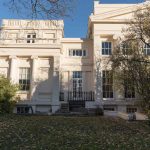 BADA’s London Theatre Program is hosted in our historic Crown Estate building in one of London’s most prestigious residential areas, which is home to a number of national embassies and ambassadorial residences.
BADA’s London Theatre Program is hosted in our historic Crown Estate building in one of London’s most prestigious residential areas, which is home to a number of national embassies and ambassadorial residences.The building has six teaching spaces, a library, the Academy’s offices, a canteen, and a Green Room for students to relax or study in between classes. There are designated computer and printing facilities for students and wireless internet connection available throughout the building.
BADA is located beside the beautiful Regent’s Park, perfect for walks between classes and picnics on sunny days. BADA’s location offers easy access to the theatres in London’s West End and is a few minutes from Camden Town, famous for its bustling markets, coffee bars, health food stores, art house cinemas and distinctive shops. BADA is also close to Primrose Hill (home to many actors, directors, writers and other artists) with a spectacular panoramic view across London.
Studying in London enables you to take advantage of the cultural and theatrical riches of one of the world’s great cities, with a history that stretches back more than two thousand years; and also to travel easily around the rest of the United Kingdom and Europe during the nine-day mid-semester break.
-
The London Theatre Program Faculty is comprised of distinguished teaching artists from a variety of theatrical backgrounds. To learn more about our current Faculty, please visit our Faculty page.
-
The London Theatre Program fees are the equivalent of one semester of Sarah Lawrence College tuition which includes all academic expenses, trips, tickets, and masterclasses.
For more information about current tuition, fees, estimated expenses, and refund policy, please visit the Sarah Lawrence College website.
Financial Aid
Sarah Lawrence College students who normally receive financial aid may apply their awards to any College-sponsored program abroad.Sarah Lawrence College offers limited financial assistance to guest students on this program. Students should consult their home school’s financial aid office for guidance on other financial aid resources.
For more information about Sarah Lawrence financial aid options, e-mail the Office of Global Education.
For questions about the application process, please contact:
Sarah Lawrence College
Office of Global Education
1 Mead Way
Bronxville, NY 10708-5999slcaway@sarahlawrence.edu
T: 914 395 2305For further information or any questions regarding the London Theatre Program, please contact:
British American Drama Academy
Seth Dranginis, Marketing & Development Manager
sdranginis@bada.org.uk -
Recent productions from Acting in Performance:

